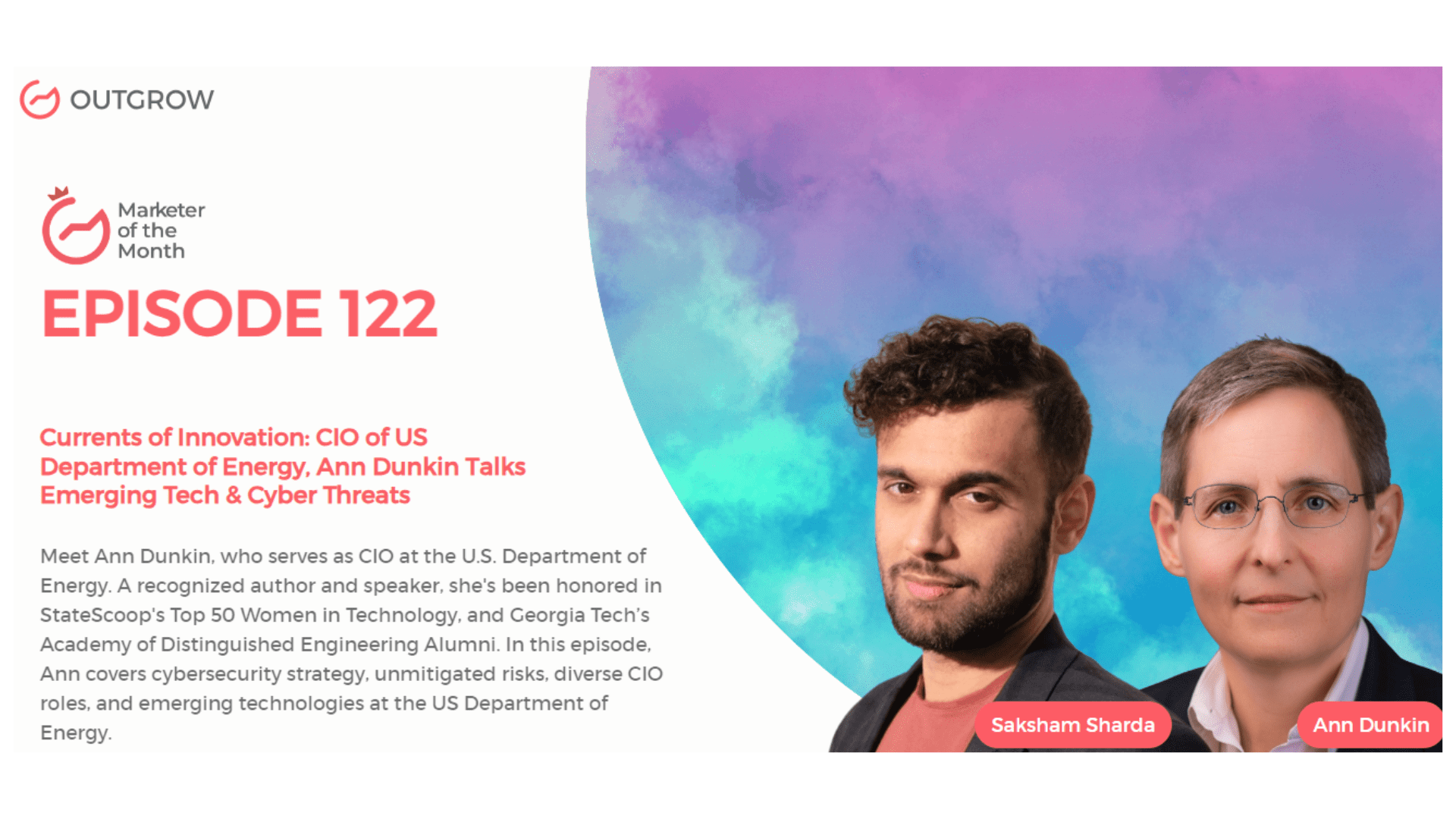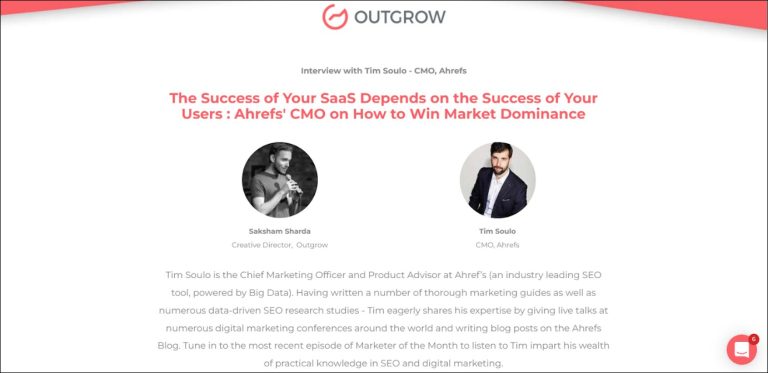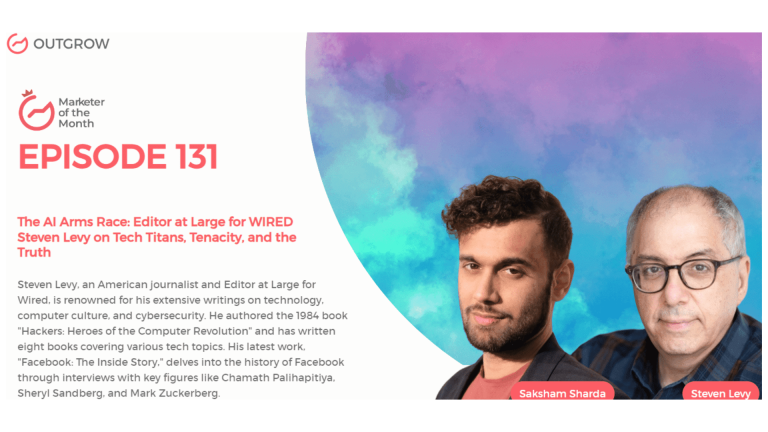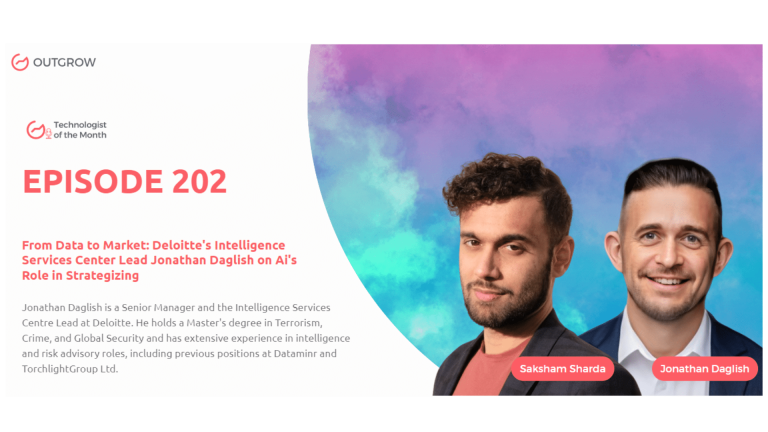EPISODE 122: Marketer of the Month Podcast with Ann Dunkin
Table of Contents
Hey there! Welcome to the Marketer Of The Month blog!
We recently interviewed Ann Dunkin for our monthly podcast – ‘Marketer of the Month’! We had some amazing insightful conversations with Ann and here’s what we discussed about-
1. Cybersecurity strategy: Mitigating digital threats at the US department of energy
2. Unmitigated risks: Addressing unresolved threats in IT security
3. Balancing innovation and legacy systems in DOE’s IT landscape
4. Decentralized investment: Prioritizing tech investments through decentralization
5. Leveraging varied CIO roles for problem-solving
6. Tech innovation: Navigating emerging technologies and risks at the DOE
About our host:
Dr. Saksham Sharda is the Chief Information Officer at Outgrow.co. He specializes in data collection, analysis, filtering, and transfer by means of widgets and applets. Interactive, cultural, and trending widgets designed by him have been featured on TrendHunter, Alibaba, ProductHunt, New York Marketing Association, FactoryBerlin, Digimarcon Silicon Valley, and at The European Affiliate Summit.
About our guest:
Meet Ann Dunkin, who serves as CIO at the U.S. Department of Energy. A recognized author and speaker, she’s been honored in StateScoop’s Top 50 Women in Technology, and Georgia Tech’s Academy of Distinguished Engineering Alumni. In this episode, Ann covers cybersecurity strategy, unmitigated risks, diverse CIO roles, and emerging technologies at the US Department of Energy.
Currents of Innovation: CIO of the US Department of Energy, Ann Dunkin Talks about Emerging Tech & Cyber Threats
The Intro!
Saksham Sharda: Hi, everyone. Welcome to another episode of Outgrow’s Marketer of the Month. I’m your host, Dr. Saksham Sharda, and I’m the creative director at Outgrow. co. And for this month we are going to interview Ann Dunkin, who is CIO at the U.S. Department of Energy.
Ann Dunkin: Great to be here. Thank you.
Don’t have time to read? No problem, just watch the Podcast!
Or you can just listen to it on Spotify!
The Rapid Fire Round!
Saksham Sharda: So the rapid fire round. The first one is at what age do you want to retire?
Ann Dunkin: Last week. No. Seriously, in my 60’s.
Saksham Sharda: What’s your favorite mobile app?
Ann Dunkin: Favorite mobile app. Oh, gosh. I don’t know if I have one. I’m sorry.
Saksham Sharda: Google Maps or something.
Ann Dunkin: That’s true. Yeah, that’s a good one.
Saksham Sharda: How long does it take you to get ready in the mornings?
Ann Dunkin: It depends. Well, I have to feed cats or not, so between 45 minutes and an hour.
Saksham Sharda: Most embarrassing moment of your life?
Ann Dunkin: I think when I was in graduate school, and I was at a dinner and they served cantaloupe and I tried to use the spoon to cut the candle off, but it flew over my shoulder and it’s somewhere in the back.
Saksham Sharda: Mountains or beaches?
Ann Dunkin: Beaches.
Saksham Sharda: What’s the most useful mobile feature you can’t live without?
Ann Dunkin: I add to texting I think.
Saksham Sharda: Favorite color?
Ann Dunkin: Blue.
Saksham Sharda: What time of day are you most inspired?
Ann Dunkin: Around one in the morning.
Saksham Sharda: How many hours of sleep do you need?
Ann Dunkin: As many as I can get.
Saksham Sharda: An upcoming telecommunications trend is ________.
Ann Dunkin: An upcoming telecommunications trend is faster and faster.
Saksham Sharda: The city in which the best kiss of your life happened?
Ann Dunkin: Oh, that’s awesome. Atlanta.
Saksham Sharda: Pick one Apple or Android.
Ann Dunkin: Apple.
Saksham Sharda: The biggest mistake of your career?
Ann Dunkin: It was taking a certain job that I won’t name.
Saksham Sharda: How do you relax?
Ann Dunkin: I would like to relax by exercising and reading lots of different things.
Saksham Sharda: How many cups of coffee do you drink per day?
Ann Dunkin: None.
Saksham Sharda: A habit of yours that you hate?
Ann Dunkin: I hate working too late.
Saksham Sharda: Which US Department would you never work for?
Ann Dunkin: Oh, I think I’ll pass that one.
Saksham Sharda: The most valuable skill you’ve learned in life.
Ann Dunkin: Being nice to other people.
Saksham Sharda: Which US Department you would love to work for?
Ann Dunkin: The US Department that I’d love to work for that I haven’t worked for already would probably be the State Department.
Saksham Sharda: Cities or countryside?
Ann Dunkin: Cities.
Saksham Sharda: Your Favorite Netflix Show?
Ann Dunkin: I can’t think of them ever now. It was the one set in DC years ago. I can’t think of it. Yeah, I’m sorry. So good, I can’t think of the name.
The Big Questions!
Saksham Sharda: All right. So we’re gonna go on to the long question. You can answer with as much ease and time as you’d like. The first one is how do you ensure that the US Department of Energy’s information technology infrastructure is secure against cyber attacks and other forms of digital threats?
Ann Dunkin: Well, that’s a big problem. The first is evaluating risks, making sure to identify our highest risk areas, and mitigating those risks as fully and completely as we can. Because we can’t do everything. So we take the risk-based approach. The second is coordinating. So we coordinate among DOE, we coordinate with the interagency, we coordinate with others who have classified information, to share it to create an unclassified version of that, bring it to the unclassified level, and share that information out. So we share both things we know are going on and then we pull in things we’re hearing from our organization. So that’s the second thing and then the third one is always being vigilant, always paying attention, training our staff, training our users to always be aware of what’s going on.
Saksham Sharda: Which one of these is most likely to cause problems?
Ann Dunkin: Well, I think that because we are not able to mitigate every risk the ultimate risk is that we will have an unmitigated risk that will turn out to be the one that gets us. So we try very hard to make sure that we can respond and recover from that if it does happen.
Saksham Sharda: How do you balance the need for innovation and new technology with the necessity of maintaining legacy systems that are critical to the department’s mission?
Ann Dunkin: So that’s fundamentally a budget problem. And it’s a budget problem both with sample money and having enough people to attack the problem. So we try to make sure that we prioritize a percentage of our money to invest in new technologies. And we look at ways that we can reduce the amount of money we’re spending on legacy technology without putting ourselves in the position where we’re not keeping that sufficiently up-to-date or secure. But we’re going to constantly try and push more funding into the innovation. Because the more innovation we get, the more new stuff we get, and the less legacy technology there is. One of our goals is not to build more legacy technology to go to the cloud to offer a service to use modular applications, and low-code platforms so that we don’t end up with the same kind of legacy that we have now in the future.
Saksham Sharda: How do you prioritize technology investments and ensure that they are aligned with the department’s strategic goals?
Ann Dunkin: So DOE is decentralized so part of the way we prioritize technology investments is pushing that decision-making for investments down into the organization because each visual part of the organization knows what they need the most. So they’re able to select things that best meet their mission, then one of my jobs is to try and make sure we do as little duplicative work as possible in that process. Because with everybody doing what they need to meet their mission, it’s easy to buy the same thing over and over again. And so then we work on things like providing enterprise agreements and platforms and solutions so that when we identify the same meat across the board, we can share that capability.
Saksham Sharda: And what have you brought from your previous roles as the big CIO of all the big companies to the US Department of Energy?
Ann Dunkin: So I think everywhere I’ve been, I’ve learned something, lots of something usually. And I’ve had a huge variety of experiences that have led me to the point where you can look at a problem ultimately. And it’s not the same problem. But it kind of looks like that problem. And so you learn over time, by having these experiences as a CIO over and over again, what you need to do as a CIO to be successful, what kind of problems you’re going to see, and how to solve them. And you can’t think, well, I can do everything exactly what I did at Dell, or Santa Clara County, or somewhere else. But what I can do is say I’ve learned some things there that helped me understand what these problems are and how to solve them.
Saksham Sharda: So how do you think the US Department of Energy is taking advantage of emerging technologies such as artificial intelligence and blockchain while also managing the risks associated with these techs?
Ann Dunkin: So DOE is kind of an interesting place because we don’t just take advantage of those technologies, we invent them. So, we sometimes call it the Department of Everything, or 17 National Labs, design and develop all sorts of new technology. So we have a little advantage when it comes to taking advantage of the price of the products and technologies as well as mitigating the risks. Because we deeply understand those risks, DOE because we invented or developed capabilities in many of those technologies. So we work with our labs, work with our partners inside the company to understand what risks we may be taking on, and then mitigate those appropriately.
Saksham Sharda: So with the increasing number of connected devices and the growing threat of cyber attacks, what do you see as the biggest challenges facing network providers?
Ann Dunkin: So you hit the nail on the head. There are all these IoT devices, they’re all in your networks. They’re often not treated like enterprise devices. So how do we make sure that we treat them like enterprise devices, that they’re well secured, and that they meet all of our requirements in terms of how they connect to the network? And what kind of password requirements do they have? And those sorts of things. So the big risk is the proliferation of devices and making sure all of them are managed.
Saksham Sharda: And so what challenges do remote work and distributed teams have today present to network security?
Ann Dunkin: So I’m not sure that remote work and distributed teams promote a lot more security risks than we already had. We’ve had people working all around the world, all around the country, you know, for many years to DOE, more people work remotely now than ever before. But they mainly present collaboration challenges, finding new ways to work together. We were already well on the path of moving away from reliance on that network perimeter, which would probably be the biggest reason to be concerned about remote work. So network perimeter is just one of many tools we have to protect and secure our capabilities. We’re all in for zero trust. And we assume that anyone who comes into our network could be compromised, it could be a bot, or it could be an intruder. And we’re going to assume that and we’re going to identify all our assets, we’re gonna put authentication on each asset. And the level of authentication level security required depends upon how high a value that asset has. And that doesn’t change whether people are working inside our buildings or outside our buildings.
Saksham Sharda: The last question for you is more of a personal kind, What would you be doing in your life if not this right now?
Ann Dunkin: If I weren’t doing this right now, I would probably be the CIO at a private company, or maybe be retired. I don’t know. It’s not quite, I didn’t quite hit the mark I gave you for retirement yet. So I got a few more years before I hit that mark.
Let’s Conclude!
Saksham Sharda: Thanks, everyone for joining us for this month’s episode of Outgrow’s Marketer of the Month. That was Ann Dunkin, who is the CIO at the U.S. Department of Energy.
Ann Dunkin: Pleasure. Thanks for having me.
Saksham Sharda: Check out the website for more details and we’ll see you once again next month with another marketer of the month.

Muskan is a Marketing Analyst at Outgrow. She is working on multiple areas of marketing. On her days off though, she loves exploring new cafes, drinking coffee, and catching up with friends.








